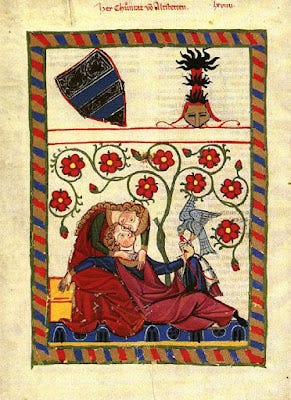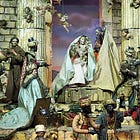The word "alba" derives from the Latin "albus" (white), evoking the gradual lightening of the sky in the transition between nocturnal darkness and daylight.
In English: dawn, sunrise.
G. Pellizza da Volpedo, Rising sun (1904)
In the refined tradition of medieval Occitan poetry, "alba" transcends its literal meaning to become a poetic genre suspended between the sacred and the profane.
It sings of the anguish of separation between two clandestine lovers who must part at sunrise after a night of passion to avoid discovery.
Thus, the Provençal troubadour Giraut De Borneil, active in the second half of the 12th century, sang about the arrival of dawn.
Bel companho, si dormetz o velhatz, / No dormatz plus, suau vos ressidatz! / Qu'en orien vei l'estela creguda / C'amena.l jorn, qu'eu l'ai be conoguda, / Et ades sera l'alba
Bel companho, en chantan vos apel! / No dormatz plus, qu'eu auch chantar l'auzel / Que vai queren lo jorn per lo boschatge / Et ai paor que.l gilos vos assatge / Et ades sera l'alba
Fair companion, do you sleep or wake? / Whatever you do, rise to your feet, / for in the east I see the star has risen, / the one that brings the day: / I have recognized it well, / and soon it will be dawn.
Fair companion, I call to you singing; / sleep no more, for I hear the bird singing, / the one that seeks the day in the woods, / and I fear the jealous one may attack you, / and soon it will be dawn.
Image from “Codex Manesse”
Yet perhaps the most celebrated lovers' dawn parting is the one immortalized by Shakespeare in his late 16th-century tragedy "Romeo and Juliet."
The exchange between the two protagonists about the nature of the bird's song - nightingale or lark - becomes a poetic negotiation with time itself, a desperate attempt to hold back the protective night.
JULIET
Wilt thou be gone? It is not yet near day. / It was the nightingale, and not the lark, / That pierced the fearful hollow of thine ear. / Nightly she sings on yond pomegranate tree. / Believe me, love, it was the nightingale.
ROMEO
It was the lark, the herald of the morn, / No nightingale. Look, love, what envious streaks / Do lace the severing clouds in yonder east. / Night’s candles are burnt out, and jocund day / Stands tiptoe on the misty mountain tops. / I must be gone and live, or stay and die.
F. Hayez, The Last Kiss Given to Juliet by Romeo (1823)
Through the centuries, dawn thus continues to represent that liminal moment where hope and sorrow intertwine, rebirth and separation merge, in an ambivalence that has made it one of the most evocative motifs in Western literary tradition.
There’s another famous “alba” that must be mentioned: the triumphant cry of victory in Puccini’s Turandot. Here is Pavarotti’s unforgettable rendition of Nessun dorma with its iconic line, ‘all’alba vincerò’ (at dawn, I will win)… enjoy!
Do you love etymology as much as I do? Then you might also enjoy these articles from the 'Belle Parole' series:







I love the homage to Pavarotti in the end. The legend somehow bridges dawn and sunset in his work. As did you here in this piece. I enjoyed reading this.
So lovely to read this in the morning, thank you, HM!